新概念英语第4册课文笔记
新概念英语第四册课堂笔记
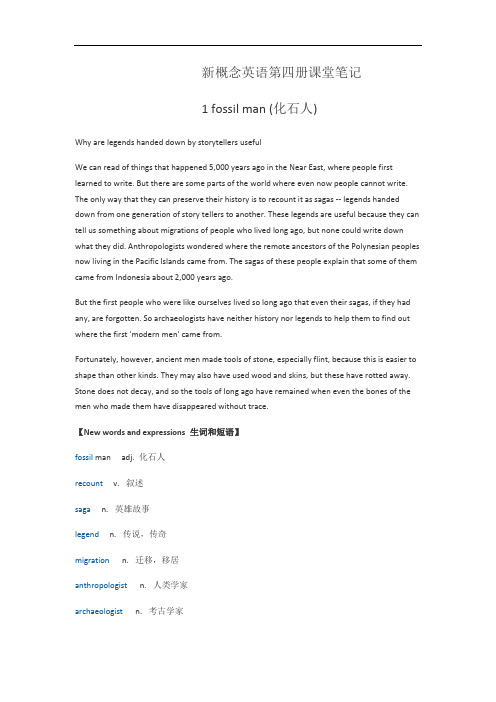
新概念英语第四册课堂笔记1 fossil man (化石人)Why are legends handed down by storytellers usefulWe can read of things that happened 5,000 years ago in the Near East, where people first learned to write. But there are some parts of the world where even now people cannot write. The only way that they can preserve their history is to recount it as sagas -- legends handed down from one generation of story tellers to another. These legends are useful because they can tell us something about migrations of people who lived long ago, but none could write down what they did. Anthropologists wondered where the remote ancestors of the Polynesian peoples now living in the Pacific Islands came from. The sagas of these people explain that some of them came from Indonesia about 2,000 years ago.But the first people who were like ourselves lived so long ago that even their sagas, if they had any, are forgotten. So archaeologists have neither history nor legends to help them to find out where the first 'modern men' came from.Fortunately, however, ancient men made tools of stone, especially flint, because this is easier to shape than other kinds. They may also have used wood and skins, but these have rotted away. Stone does not decay, and so the tools of long ago have remained when even the bones of the men who made them have disappeared without trace.【New words and expressions 生词和短语】fossil man adj. 化石人recount v. 叙述saga n. 英雄故事legend n. 传说,传奇migration n. 迁移,移居anthropologist n. 人类学家archaeologist n. 考古学家ancestor n. 祖先Polynesian adj.波利尼西亚(中太平洋之一群岛)的Indonesia n. 印度尼西亚flint n. 燧石rot n. 烂掉【课文注释】down 把...传下去例句:Many old legends were handed down from generation by mouth.许多古老的传说都是一代一代口传下来了。
新概念第四册课文翻译及学习笔记:Lesson41
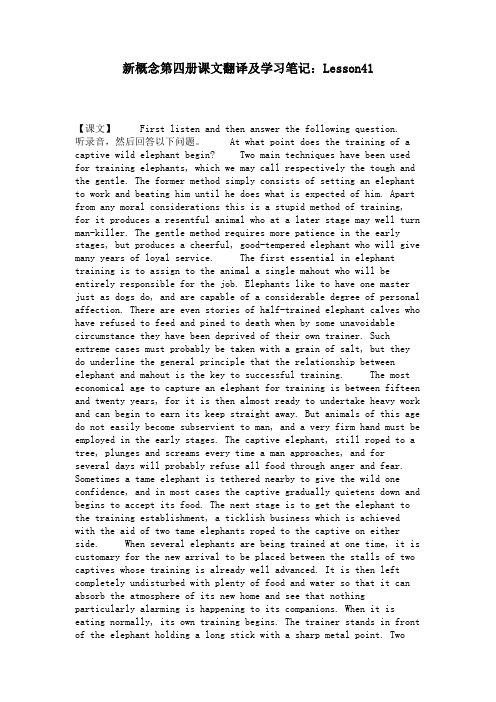
新概念第四册课文翻译及学习笔记:Lesson41【课文】First listen and then answer the following question.听录音,然后回答以下问题。
At what point does the training of a captive wild elephant begin? Two main techniques have been used for training elephants, which we may call respectively the tough and the gentle. The former method simply consists of setting an elephant to work and beating him until he does what is expected of him. Apart from any moral considerations this is a stupid method of training,for it produces a resentful animal who at a later stage may well turn man-killer. The gentle method requires more patience in the early stages, but produces a cheerful, good-tempered elephant who will give many years of loyal service. The first essential in elephant training is to assign to the animal a single mahout who will be entirely responsible for the job. Elephants like to have one master just as dogs do, and are capable of a considerable degree of personal affection. There are even stories of half-trained elephant calves who have refused to feed and pined to death when by some unavoidable circumstance they have been deprived of their own trainer. Such extreme cases must probably be taken with a grain of salt, but they do underline the general principle that the relationship between elephant and mahout is the key to successful training. The most economical age to capture an elephant for training is between fifteen and twenty years, for it is then almost ready to undertake heavy work and can begin to earn its keep straight away. But animals of this age do not easily become subservient to man, and a very firm hand must be employed in the early stages. The captive elephant, still roped to a tree, plunges and screams every time a man approaches, and for several days will probably refuse all food through anger and fear. Sometimes a tame elephant is tethered nearby to give the wild one confidence, and in most cases the captive gradually quietens down and begins to accept its food. The next stage is to get the elephant to the training establishment, a ticklish business which is achieved with the aid of two tame elephants roped to the captive on either side. When several elephants are being trained at one time, it is customary for the new arrival to be placed between the stalls of two captives whose training is already well advanced. It is then left completely undisturbed with plenty of food and water so that it can absorb the atmosphere of its new home and see that nothingparticularly alarming is happening to its companions. When it is eating normally, its own training begins. The trainer stands in front of the elephant holding a long stick with a sharp metal point. Twoassistants, mounted on tame elephants, control the captive fromeither side, while others rub their hands over his skin to the accompaniment of a monotonous and soothing chant. This is supposed to induce pleasurable sensations in the elephant, and its effects are reinforced by the use of endearing epithets. such as'ho! my son', or 'ho! my father', or 'my mother', according to the age and sex of the captive. The elephant is not immediately susceptible to such blandishments, however, and usually lashes fiercely with its trunk in all directions. These movements are controlled by the trainer with the metal-pointed stick, and the trunk eventually becomes so sorethat the elephant curls it up and seldom afterwards uses it for offensive purposes. RICHARD CARRINGTON Elephants 【New words and expressions 生词和短语】technique n. 技术tough adj. 强硬的resentful adj. 忿恨不满的assign v. 分配,指派mahout n. 驯象人calf n. 幼仔pine v. 消瘦underline v. 着重说明,强调keep n. 生计subservient adj. 屈从的plunge v. 向前冲tame adj. 养驯服了的tether v. (用绳)拴ticklish adj. 难对付的,棘手的alarming adj. 引起惊恐的accompaniment n. 伴奏soothe v. 镇定chant n. 单调的歌reinforce v. 加强endearing adj.惹人喜爱的epithet n. 称呼susceptible adj. 易受感动的blandishment n. 奉承lash v. 猛烈地甩curl v. 使卷曲【课文注释】 1.the tough 强硬法the gentle 温柔法 2.resentful adj.愤懑不满的例句:Some Americans are resentful, so they must find an opportunity to vent their anger. 一些美国人心中不满,就要找个机会来发泄。
新概念英语第四册课文翻译及学习笔记:Lesson33
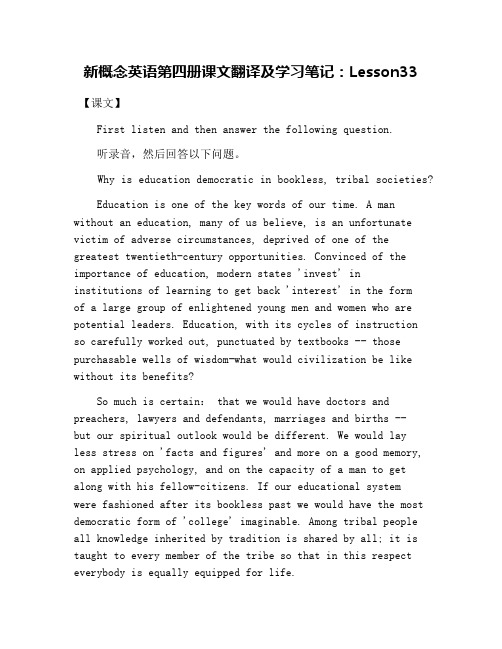
新概念英语第四册课文翻译及学习笔记:Lesson33【课文】First listen and then answer the following question.听录音,然后回答以下问题。
Why is education democratic in bookless, tribal societies?Education is one of the key words of our time. A man without an education, many of us believe, is an unfortunate victim of adverse circumstances, deprived of one of the greatest twentieth-century opportunities. Convinced of the importance of education, modern states 'invest' ininstitutions of learning to get back 'interest' in the formof a large group of enlightened young men and women who are potential leaders. Education, with its cycles of instruction so carefully worked out, punctuated by textbooks -- those purchasable wells of wisdom-what would civilization be like without its benefits?So much is certain: that we would have doctors and preachers, lawyers and defendants, marriages and births --but our spiritual outlook would be different. We would lay less stress on 'facts and figures' and more on a good memory, on applied psychology, and on the capacity of a man to get along with his fellow-citizens. If our educational system were fashioned after its bookless past we would have the most democratic form of 'college' imaginable. Among tribal people all knowledge inherited by tradition is shared by all; it is taught to every member of the tribe so that in this respect everybody is equally equipped for life.It is the ideal condition of the 'equal start' which only our most progressive forms of modern education try to regain. In primitive cultures the obligation to seek and to receive the traditional instruction is binding to all. There are no 'illiterates' -- if the term can be applied to peoples without a script -- while our own compulsory school attendance became law in Germany in 1642, in France in 1806, and in England in 1876, and is still non-existent in a number of 'civilized' nations. This shows how long it was before we deemed it necessary to make sure that all our children could share in the knowledge accumulated by the 'happy few' during the past centuries.Education in the wilderness is not a matter of monetary means. All are entitled to an equal start. There is none of the hurry which, in our society, often hampers the full development of a growing personality. There, a child grows up under the ever-present attention of his parent; therefore the jungles and the savannahs know of no 'juvenile delinquency'. No necessity of making a living away from home results in neglect of children, and no father is confronted with his inability to 'buy' an education for his child.JULIUS E. LIPS The Origin of Things【New words and expressions 生词和短语】adverse adj. 不利的purchasable adj.可买到的preacher n. 传教士defendant n. 被告outlook n. 视野capacity n. 水平democratic adj. 民主的tribal n. 部落的tribe n. 部落illiterate n. 文盲compulsory adj. 义务的deem v. 认为means n. 方法,手段,财产,资力hamper v. 妨碍savannah n. 大草原juvenile adj. 青少年delinquency n. 犯罪【课文注释】1.adverse adj. 不利的, 逆向的, 有害的例句: The development was adverse to our interests.这种发展与我们的利益背道而驰。
新概念英语第4册课文笔记
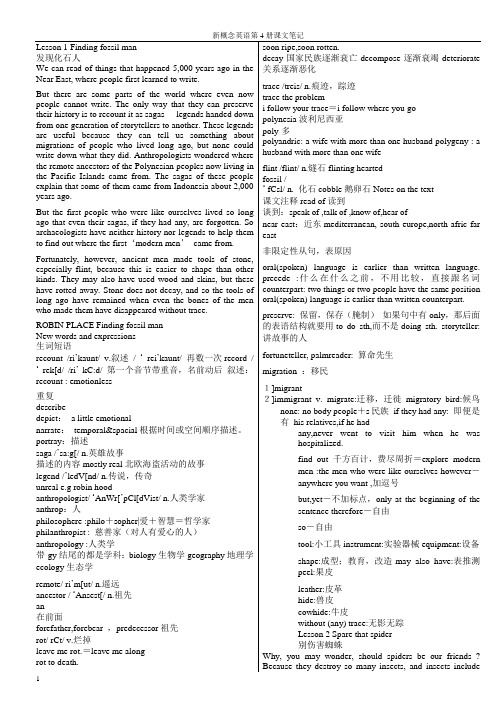
decay国家民族逐渐衰亡decompose逐渐衰竭deteriorate关系逐渐恶化
trace /treis/ n.痕迹,踪迹
trace the problem
i follow your trace=i follow where you go
polynesia波利尼西亚
poly-多
polyandric: a wife with more than one husband polygeny : a husband with more than one wife
ROBINPLACE Finding fossil man
New words and expressions
生词短语
recount /ri’kaunt/ v.叙述/‘rei’kaunt/再数一次record /‘rek[d/ /ri’kC:d/第一个音节带重音,名前动后叙述:recount :emotionless
unreal e.g robin hood
anthropologist/‘AnWr[’pCl[dVist/ n.人类学家
anthrop:人
philosophere :philo+sopher|爱+智慧=哲学家
新概念英语第四册45精讲笔记
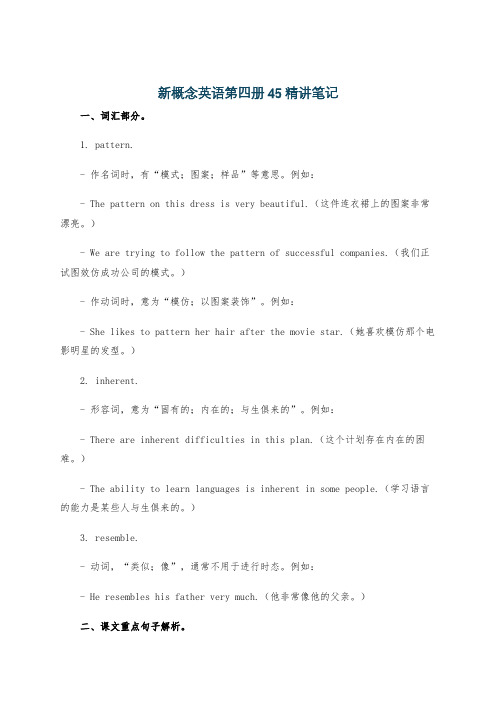
新概念英语第四册45精讲笔记一、词汇部分。
1. pattern.- 作名词时,有“模式;图案;样品”等意思。
例如:- The pattern on this dress is very beautiful.(这件连衣裙上的图案非常漂亮。
)- We are trying to follow the pattern of successful companies.(我们正试图效仿成功公司的模式。
)- 作动词时,意为“模仿;以图案装饰”。
例如:- She likes to pattern her hair after the movie star.(她喜欢模仿那个电影明星的发型。
)2. inherent.- 形容词,意为“固有的;内在的;与生俱来的”。
例如:- There are inherent difficulties in this plan.(这个计划存在内在的困难。
)- The ability to learn languages is inherent in some people.(学习语言的能力是某些人与生俱来的。
)3. resemble.- 动词,“类似;像”,通常不用于进行时态。
例如:- He resembles his father very much.(他非常像他的父亲。
)二、课文重点句子解析。
1. “In man, the genes which help to build up the brain and nervous system may be the most important.”- 这是一个主从复合句,“which help to build up the brain and nervous system”是一个定语从句,用来修饰先行词“genes”。
在翻译时,可以先翻译定语从句,再翻译主句,即“在人类身上,有助于构建大脑和神经系统的基因可能是最为重要的。
”2. “So far, we have been looking at the way man's genes have built him as an individual.”- 这里“have been looking at”是现在完成进行时,表示从过去某一时间开始一直持续到现在的动作。
新概念英语第四册课文翻译及学习笔记:Lesson34
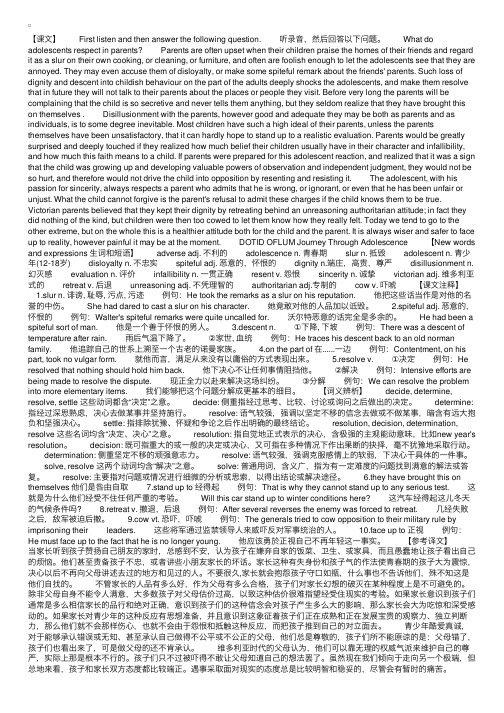
【课⽂】 First listen and then answer the following question. 听录⾳,然后回答以下问题。
What do adolescents respect in parents? Parents are often upset when their children praise the homes of their friends and regard it as a slur on their own cooking, or cleaning, or furniture, and often are foolish enough to let the adolescents see that they are annoyed. They may even accuse them of disloyalty, or make some spiteful remark about the friends' parents. Such loss of dignity and descent into childish behaviour on the part of the adults deeply shocks the adolescents, and make them resolve that in future they will not talk to their parents about the places or people they visit. Before very long the parents will be complaining that the child is so secretive and never tells them anything, but they seldom realize that they have brought this on themselves . Disillusionment with the parents, however good and adequate they may be both as parents and as individuals, is to some degree inevitable. Most children have such a high ideal of their parents, unless the parents themselves have been unsatisfactory, that it can hardly hope to stand up to a realistic evaluation. Parents would be greatly surprised and deeply touched if they realized how much belief their children usually have in their character and infallibility, and how much this faith means to a child. If parents were prepared for this adolescent reaction, and realized that it was a sign that the child was growing up and developing valuable powers of observation and independent judgment, they would not be so hurt, and therefore would not drive the child into opposition by resenting and resisting it. The adolescent, with his passion for sincerity, always respects a parent who admits that he is wrong, or ignorant, or even that he has been unfair or unjust. What the child cannot forgive is the parent's refusal to admit these charges if the child knows them to be true. Victorian parents believed that they kept their dignity by retreating behind an unreasoning authoritarian attitude; in fact they did nothing of the kind, but children were then too cowed to let them know how they really felt. Today we tend to go to the other extreme, but on the whole this is a healthier attitude both for the child and the parent. It is always wiser and safer to face up to reality, however painful it may be at the moment. DOTID OFLUM Journey Through Adolescence 【New words and expressions ⽣词和短语】 adverse adj. 不利的 adolescence n. 青春期 slur n. 抵毁 adolescent n. 青少年(12-18岁) disloyalty n. 不忠实 spiteful adj. 恶意的,怀恨的 dignity n.端庄,⾼贵,尊严 disillusionment n.幻灭感 evaluation n. 评价 infallibility n. ⼀贯正确 resent v. 怨恨 sincerity n. 诚挚 victorian adj. 维多利亚式的 retreat v. 后退 unreasoning adj. 不凭理智的 authoritarian adj.专制的 cow v. 吓唬 【课⽂注释】 1.slur n. 诽谤, 耻辱, 污点, 污迹 例句:He took the remarks as a slur on his reputation. 他把这些话当作是对他的名誉的中伤。
新概念第四册Lesson28~30课文翻译及学习笔记
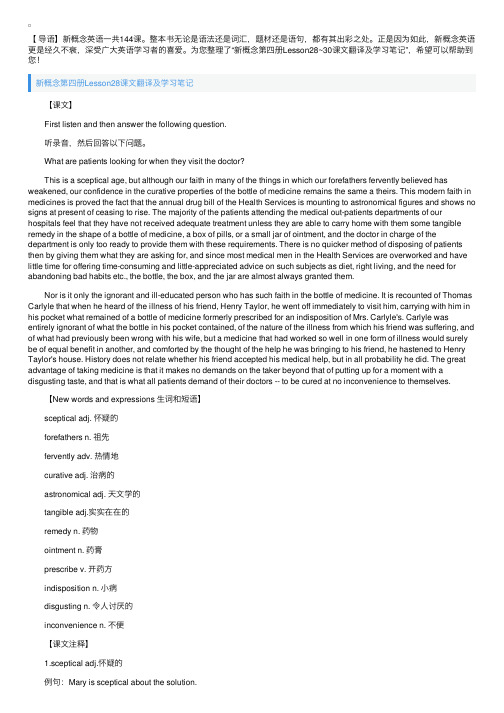
【导语】新概念英语⼀共144课。
整本书⽆论是语法还是词汇,题材还是语句,都有其出彩之处。
正是因为如此,新概念英语更是经久不衰,深受⼴⼤英语学习者的喜爱。
为您整理了“新概念第四册Lesson28~30课⽂翻译及学习笔记”,希望可以帮助到您!新概念第四册Lesson28课⽂翻译及学习笔记 【课⽂】 First listen and then answer the following question. 听录⾳,然后回答以下问题。
What are patients looking for when they visit the doctor? This is a sceptical age, but although our faith in many of the things in which our forefathers fervently believed has weakened, our confidence in the curative properties of the bottle of medicine remains the same a theirs. This modern faith in medicines is proved the fact that the annual drug bill of the Health Services is mounting to astronomical figures and shows no signs at present of ceasing to rise. The majority of the patients attending the medical out-patients departments of our hospitals feel that they have not received adequate treatment unless they are able to carry home with them some tangible remedy in the shape of a bottle of medicine, a box of pills, or a small jar of ointment, and the doctor in charge of the department is only too ready to provide them with these requirements. There is no quicker method of disposing of patients then by giving them what they are asking for, and since most medical men in the Health Services are overworked and have little time for offering time-consuming and little-appreciated advice on such subjects as diet, right living, and the need for abandoning bad habits etc., the bottle, the box, and the jar are almost always granted them. Nor is it only the ignorant and ill-educated person who has such faith in the bottle of medicine. It is recounted of Thomas Carlyle that when he heard of the illness of his friend, Henry Taylor, he went off immediately to visit him, carrying with him in his pocket what remained of a bottle of medicine formerly prescribed for an indisposition of Mrs. Carlyle's. Carlyle was entirely ignorant of what the bottle in his pocket contained, of the nature of the illness from which his friend was suffering, and of what had previously been wrong with his wife, but a medicine that had worked so well in one form of illness would surely be of equal benefit in another, and comforted by the thought of the help he was bringing to his friend, he hastened to Henry Taylor's house. History does not relate whether his friend accepted his medical help, but in all probability he did. The great advantage of taking medicine is that it makes no demands on the taker beyond that of putting up for a moment with a disgusting taste, and that is what all patients demand of their doctors -- to be cured at no inconvenience to themselves. 【New words and expressions ⽣词和短语】 sceptical adj. 怀疑的 forefathers n. 祖先 fervently adv. 热情地 curative adj. 治病的 astronomical adj. 天⽂学的 tangible adj.实实在在的 remedy n. 药物 ointment n. 药膏 prescribe v. 开药⽅ indisposition n. ⼩病 disgusting n. 令⼈讨厌的 inconvenience n. 不便 【课⽂注释】 1.sceptical adj.怀疑的 例句:Mary is sceptical about the solution. 玛丽对这个解决办法表⽰怀疑。
新概念第四册课文翻译及学习笔记【Lesson31、32、33】

【导语】新概念英语作为⼀套世界闻名的英语教程,以其全新的教学理念,有趣的课⽂内容和全⾯的技能训练,深受⼴⼤英语学习者的欢迎和喜爱。
为了⽅便同学们的学习,为⼤家整理了⾯的新概念第四册课⽂翻译及学习笔记,希望为⼤家的新概念英语学习提供帮助!Lesson31 【课⽂】 First listen and then answer the following question. 听录⾳,然后回答以下问题。
What do you have to be able to do to appreciate sculpture? Appreciation of sculpture depends upon the ability to respond to form in three dimension. That is perhaps why sculpture has been described as the most difficult of all arts; certainly it is more difficult than the arts which involve appreciation of flat forms, shape in only two dimensions. Many more people are 'form-blind' than colour-blind. The child learning to see, first distinguishes only two-dimensional shape; it cannot judge distances, depths. Later, for its personal safety and practical needs, it has to develop (partly by means of touch) the ability to judge roughly three-dimensonal distances. But having satisfied the requirements of practical necessity, most people go no further. Though they may attain considerable accuracy in the perception of flat form, they do not make the further intellectual and emotional effort needed to comprehend form in its full spatial existence. This is what the sculptor must do. He must strive continually to think of, and use, form in its full spatial completeness. He gets the solid shape, as it were, inside his head-he thinks of it, whatever its size, as if he were holding it completely enclosed in the hollow of his hand. He mentally visualizes a complex form from all round itself; he knows while he looks at one side what the other side is like, he identifies himself with its centre of gravity, its mass, its weight; he realizes its volume, as the space that the shape displaces in the air. And the sensitive observer of sculpture must also learn to feel shape simply as shape, not as description or reminiscence. He must, for example, perceive an egg as a simple single solid shape, quite apart from its significance as food, or from the literary idea that it will become a bird. And so with solids such as a shell, a nut, a plum, a pear, a tadpole, a mushroom, a mountain peak, a kidney, a carrot, a tree-trunk, a bird, a bud, a lark, a ladybird, a bulrush, a bone. From these he can go on to appreciate more complex forms or combinations of several forms. HENRY MOORE The Sculptor Speaks from The Listener 【New words and expressions ⽣词和短语】 auditory adj. 听觉的 colour-blind adj. ⾊盲的 perception n. 知觉 comprehend v. 理解 spatial adj. 空间 visualize v. 使具形象,设想 reminiscence n. 回忆,联想 tadpole n. 蝌蚪 mushroom n. 蘑菇 carrot n. 胡萝⼘ bud n. 花蕾 lark n. 云雀 ladybird n. 瓢⾍ bulrush n. 芦苇 【课⽂注释】 1.respond to 响应,对 … 起反应 例句:He resolved to respond to the call of the Party. 他决⼼响应党的号召。
- 1、下载文档前请自行甄别文档内容的完整性,平台不提供额外的编辑、内容补充、找答案等附加服务。
- 2、"仅部分预览"的文档,不可在线预览部分如存在完整性等问题,可反馈申请退款(可完整预览的文档不适用该条件!)。
- 3、如文档侵犯您的权益,请联系客服反馈,我们会尽快为您处理(人工客服工作时间:9:00-18:30)。
New words and expressions
生词短语
flocks and herds牛群和羊群
/flCk/
the birds of the same feather flock together.物以类聚,人以群分
but,yet-不加标点,only at the beginning of the sentence therefore-自由
so-自由
tool:小工具instrument:实验器械equipment:设备
shape:成型;教育,改造may also have:表推测peel:果皮
leather:皮革
But the first people who were like ourselves lived so long ago that even their sagas, if they had any, are forgotten. So archaeologists have neither history nor legends to help them to find out where the first‘modern men’came from.
any,never went to visit him when he was hospitalized.
find out千方百计,费尽周折=explore modern men :the men who were like ourselves however-anywhere you want ,加逗号
Spiders are not insects, as many people think, nor even nearly related to them. One can tell the difference almost at a glance for a spider always has eight legs and an insect never more than six.
Lesson 1 Finding fossil man
发现化石人
We can read of things that happened 5,000 years ago in the Near East, where people first learned to write.
But there are some parts of the world where even now people cannot write. The only way that they can preserve their history is to recount it as sagas----legends handed down from one generation of storytellers to another. These legends are useful because they can tell us something about migrations of people who lived long ago, but none couldwritedownwhattheydid.Anthropologistswonderedwheretheremote ancestors of the Polynesian peoples now living in the Pacific Islands came from. The sagas of these people explain that some of them came from Indonesia about 2,000 years ago.
remote/ ri’m[ut/ n.遥远
ancestor /‘Ansest[/ n.祖先
an
在前面
forefather,forebear,predec烂掉
leave me rot.=leave me along
rot to death.
soon ripe,soon rotten.
Fortunately, however, ancient men made tools of stone, especially flint, because this is easier to shape than other kinds. Theymay also have used wood and skins, but these have rotted away. Stone does not decay, and so the tools of long ago have remained when even the bones of the men who made them have disappeared without trace.
How many spiders are engaged in this work on our behalf ? One authority on spiders made a census of the spiders in a grass field in the south of England, and he estimated that there were more than2,250,000 inone acre, that is something like 6,000,000 spiders of different kinds on a footballpitch. Spiders arebusy for atleasthalfthe year inkillinginsects. It is impossible to makemore than the wildest guess at howmanythey kill,but they are hungry creatures, not contentwith onlythreemeals a day.It has beenestimatedthat theweight of all the insects destroyed byspiders in Britain in one year would begreaterthan the total weightof all the human beings in the country.
重复
describe
depict:a little emotional
narrate:temporal&spacial根据时间或空间顺序描述。
portray:描述
saga /’sa:g[/ n.英雄故事
描述的内容mostly real北欧海盗活动的故事
legend /’ledV[nd/ n.传说,传奇
you are the same flock.也可指人
herd多指牛群
cowherdcowboy
throngandcrowd swarm
owe /[U/ vt.感激,欠
i owe you.
i owe you a big favor.
欠issue obligeindebt appreciate----常用口语词正式:gratefulthankful
beast /bi: st/ n兽
unreal e.g robin hood
anthropologist/‘AnWr[’pCl[dVist/ n.人类学家
anthrop:人
philosophere :philo+sopher|爱+智慧=哲学家
philanthropist :慈善家(对人有爱心的人)
anthropology :人类学
带-gy结尾的都是学科:biology生物学geography地理学ecology生态学
hide:兽皮
cowhide:牛皮
without (any) trace:无影无踪
Lesson 2 Spare that spider
别伤害蜘蛛
Why, you may wonder, should spiders be our friends ? Because they destroy so many insects, and insects include some of the greatest enemies of the human race. Insects would make it impossible for us to live in the world; they would devour all our crops and kill our flocks and herds, if it were not for the protection we get from insect-eating animals. We owe a lot to the birds and beasts who eat insects but all of them put together kill only a fraction of the number destroyed by spiders. Moreover, unlike some of the other insect eaters, spiders never do the least harm to us or our belongings.
flint /flint/ n.燧石flinting hearted
fossil /
‘fCsl/ n.化石cobble鹅卵石Notes on the text
课文注释read of读到
谈到:speak of ,talk of ,know of,hear of
near east:近东mediterranean, south europe,north afric far east
